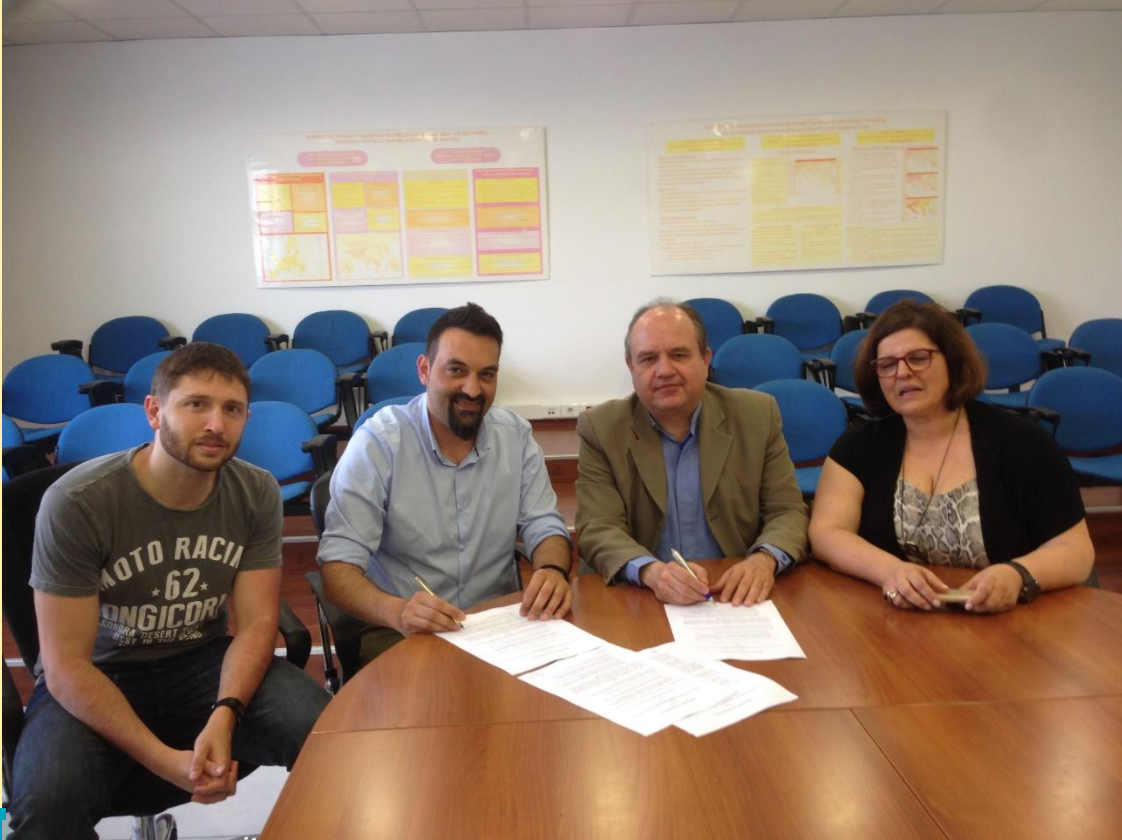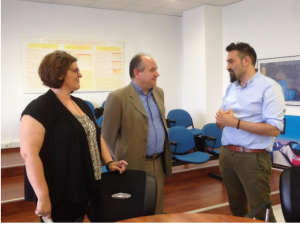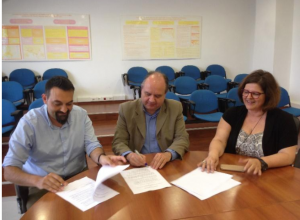On Friday, June 2, Open Knowledge Greece (OK Greece) signed a Memorandum of Understanding (MoU) with the Hellenic Institute of Transport (HIT), regarding the sharing and the analysis of transport data in the city of Thessaloniki, with the aim to predict traffic and improve mobility in the street.

HIT’s Director Dr Evangelos Bekiaris and Dr Georgia Aifadopoulou, HI Deputy Director – Research Director welcomed OK Greece President Dr Charalampos Bratsas at the Institute offices. Following the signing of the agreement, Mr Bratsas stressed:
Today, we made another step towards the efficient use and management of data in the interests of citizens. We are very happy about this cooperation and we hope for its long-term growth.
 When asked about the aim of the agreement and HIT’s benefit from its cooperation with OK Greece, Mr Bekiaris said that HIT wants to take advantage of OK Greece’s know-how on the field of data analysis, in order to highlight its own data for the common good of both Thessaloniki and the rest of Greece, in a reliable and secure way that will open the data to the largest possible public.
When asked about the aim of the agreement and HIT’s benefit from its cooperation with OK Greece, Mr Bekiaris said that HIT wants to take advantage of OK Greece’s know-how on the field of data analysis, in order to highlight its own data for the common good of both Thessaloniki and the rest of Greece, in a reliable and secure way that will open the data to the largest possible public.
Among others, Mr Bekiaris also mentioned the benefit of this effort to the end-user. More specifically, he said:
This MoU gives us the opportunity to operate data platforms, through which businesses will be able to derive the data they need, for free, in order to take initiatives and develop new services. There has not been such a thing in Greece yet, as there is in Finland, for example, but, along with OK Greece, we can develop something similar in the transport sector to allow Greek SMEs to use data and create new services, helping the public and the economy as a whole.
Dr Georgia Aifadopoulou described the agreement as the beginning of a pioneering innovation for Thessaloniki, which will also have a multiplier effect for the rest of Greece. According to her, the HIT has been running a living lab on smart mobility in Thessaloniki for years, noting that it has been recognised at the European level by introducing Thessaloniki to the official list of the EU smart cities.
The lab gathers real-time information, through an ecosystem, built by a joint venture of local institutions, such as the Municipality of Thessaloniki, the Region of Central Macedonia, as well as the TAXI and commercial fleet operators. This ecosystem processes the available information, providing citizens with plenty of services, regarding traffic, the road conditions etc.
 She also stated that through this collaboration with OK Greece, we manage to open our data, also persuading other bodies to follow our example. Our goal is to expand the existing ecosystem and promote the exchange of know-how on open data. The choice of Thessaloniki, participating in a relevant competition, as the first city at the European level to pilot the Big Data Europe – Empowering Communities with Data Technologies project in the field of mobility and transport also constitutes a great opportunity to this direction.
She also stated that through this collaboration with OK Greece, we manage to open our data, also persuading other bodies to follow our example. Our goal is to expand the existing ecosystem and promote the exchange of know-how on open data. The choice of Thessaloniki, participating in a relevant competition, as the first city at the European level to pilot the Big Data Europe – Empowering Communities with Data Technologies project in the field of mobility and transport also constitutes a great opportunity to this direction.
Dr Ms Aifadopoulou further stressed that the innovative nature of the MoU lies in the cooperation of bodies, coming from different scientific fields. According to her, data analysis is a big issue. The extraction of knowledge from data is another question. This is why we need both institutions in our venture: on the one hand, the HIT, which knows the field of mobility and on the other hand, OK Greece, which knows how to make the data analysis, offering the needed interpretations and explanations. Via this convergence, we will be able to create new knowledge for institutions, citizens, also improving the management of the transport system in Thessaloniki.
To read more about Open Knowledge Greece visit their website. You can also follow them on Twitter: @okfngr
Stories and updates from Open Knowledge chapter in Greece









